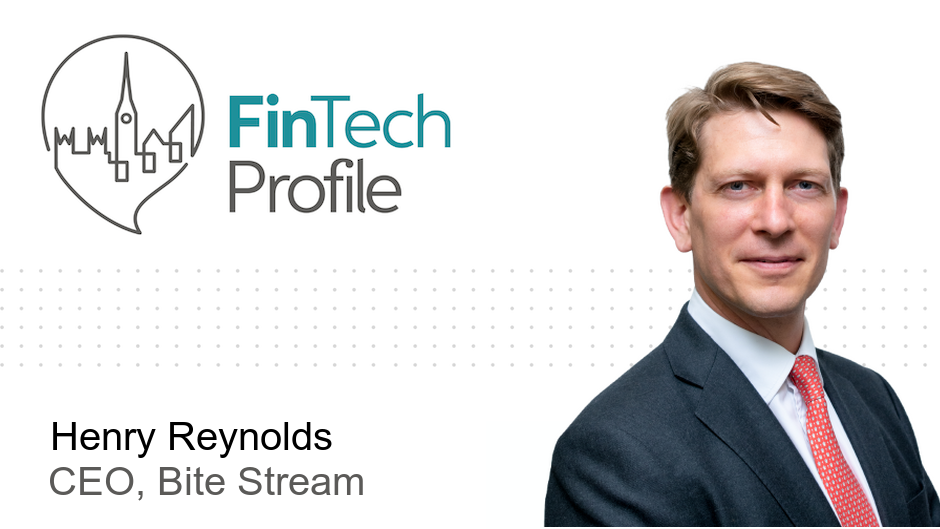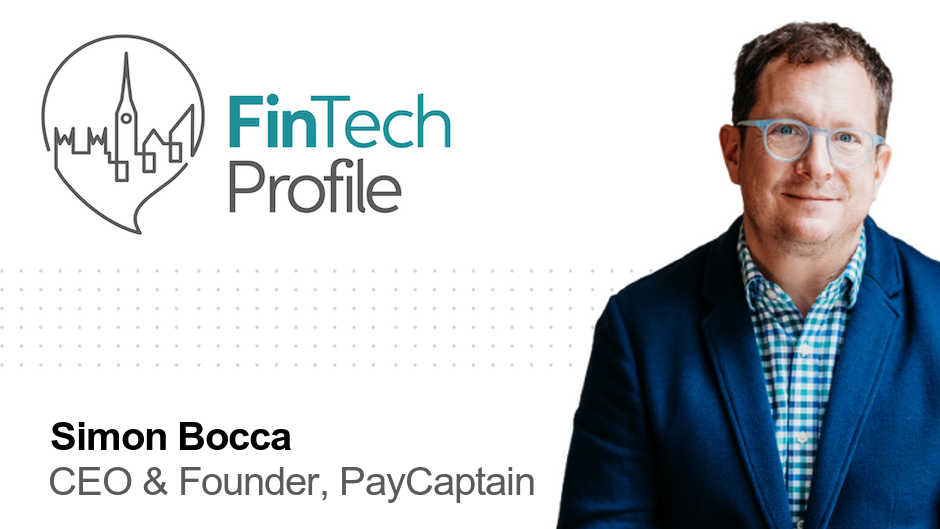Henry Reynolds, CEO of Bite Stream

Today we're meeting Henry Reynolds, CEO at Bite Stream. They specialise in helping digitize, automate and scale access to private markets through an intelligent SaaS platform for financial institutions.
Over to you Henry - my questions are in bold:
Who are you and what's your background?
I come from a background in operations and strategy, having spent over a decade optimizing complex financial workflows and building teams capable of scaling quickly and sustainably. Before stepping into the CEO role at Bite Stream earlier this year, I was the company's COO, responsible for the day-to-day execution across product, operations, and client delivery.
My career started in institutional finance, followed by a number of years in outsourced business services focused on fund administration where I developed a deep appreciation for system thinking and the levers that drive long-term growth. Moving into fintech was a natural evolution - I wanted to build. I've always been most energized when working across disciplines to solve tough problems with elegant, scalable solutions.
What is your job title and what are your general responsibilities?
As CEO of Bite Stream, I'm ultimately responsible for our strategy, people, and performance. That means I spend a lot of time with our leadership team translating our long-term vision into concrete priorities, aligning our operational roadmap with market demand, and ensuring that our team is both challenged and supported.
I'm still very hands-on - I believe a CEO should be as comfortable in a boardroom as in a product review. I came into this role from the operational side of the business, and that shapes how I lead: I focus on systems, execution, and accountability.
Can you give us an overview of your business?
Bite Stream is building a tech-enabled layer for private markets. We work with asset managers, wealth managers & advisors, and fund administrators to simplify and scale access to private market investments. Our platform automates the entire lifecycle - from onboarding and subscription to reporting and fund management.
What makes us different is how we approach the problem. Most platforms focus on digitizing documents or building investor portals. We think bigger. Our infrastructure integrates directly into our clients' operations and compliance frameworks, enabling them to launch scalable private market offerings with far less operational friction.
The feedback we hear consistently is that our clients gain speed, efficiency, and - most importantly - control. They're able to move faster without compromising on governance or brand integrity.
Tell us how you are funded?
We are backed by a mix of strategic and institutional investors who understand both fintech and the nuances of private capital markets. In the early days, we were extremely lean - something I'm still proud of. That operational discipline helped us prove our model before raising capital, and we continue to run the company with that mindset: grow, but grow intelligently.
What's the origin story? Why did you start the company? To solve what problems?
The founders were frustrated with the fragmented, manual workflows in private markets. Institutions wanted to offer private market exposure to clients, but the operational cost and compliance risk made it inefficient at best, impossible at worst.
We started Bite Stream to change that. Our goal was to build the underlying infrastructure that enables scalable, compliant, and high-quality access to these markets. In essence, we wanted to make private markets as accessible and operationally seamless as public ones - without cutting corners.
Who are your target customers? What's your revenue model?
Our primary customers are asset managers - typically mid to large-sized firms - looking to scale their investor base without scaling their headcount. We work closely with Heads of Investor Relations, COOs, and Digital Transformation leads who are grappling with the operational drag and compliance risk of managing private market investments through outdated, manual workflows.
These teams often face the same set of challenges: managing fundraising across fragmented systems, relying on spreadsheets and email, and struggling to provide a seamless investor experience. Bite Stream simplifies this. Our platform acts as an operating system for investor relations - offering a single, secure interface where teams can onboard investors, track commitments, manage documentation, and report - all in real time.
Our clients tell us we enable them to go to market faster, reduce risk, and improve investor experience without having to build their own tech stacks. One client described us as "what you'd build internally, if you had three years and a 10-person engineering team."
If you had a magic wand, what one thing would you change in the banking and/or FinTech sector?
I would shift the mindset that clings to what worked before. Too many teams continue to operate based on legacy assumptions, systems and structures, not because they are still effective, but because they are familiar. That resistance to change limits progress before it even starts.
Innovation is not just about generating new ideas. It comes when organisations are willing to reimagine how they work. Change unlocks operational efficiency, improves client outcomes and drives growth. In private markets, this is where potential meets process, and the firms that act on it will lead the next wave of transformation.
What is your message for the larger players in the Financial Services marketplace?
You do not need to reinvent the wheel, but you do need to modernize the chassis. Private markets are not just another asset class. They require a different kind of infrastructure. End-to-end solutions are no longer a luxury. They are essential to removing friction and scaling effectively.
Even if you are still in the planning phase, now is the time to act. Waiting for the perfect internal build risks falling behind as the market evolves. The better path is to find the right partners, move with discipline and stay focused on delivering a seamless client experience. That is what will define long-term success.
Where do you get your Financial Services/FinTech industry news from?
I regularly read Sifted for its sharp coverage of the European fintech and venture space. It is consistently insightful and forward-looking. For broader business and market context, I turn to The Economist, particularly the finance and economics sections. On the US side, I follow PEI and The Wall Street Journal's Markets and Private Equity coverage, which ties capital flows to industry dynamics with clarity and depth.
Can you list 3 people you rate from the FinTech and/or Financial Services sector that we should be following on LinkedIn, and why?
- Jon Gray, President & COO at Blackstone
Jon represents operational excellence at scale. His ability to lead transformational growth while keeping a clear focus on long-term fundamentals is something I greatly admire. For anyone building technology in private markets, watching how Blackstone evolves under his leadership is essential. - Devin Ryan, Head of Financial Technology Research at Citizens JMP
Devin brings a sharp, research-driven perspective on the fintech and capital markets landscape. His analysis is grounded, data-led and highly relevant for anyone navigating the intersection of finance, technology and distribution. He consistently surfaces strategic trends before they hit the mainstream and is a valuable voice for industry leaders and operators alike. - Miriam Gottfried, Reporter at The Wall Street Journal
Miriam consistently delivers some of the most insightful and well-researched coverage of private equity and the broader alternatives space. She's a must-follow if you want real context behind the headlines - not just what's happening, but why it matters.
What FinTech services (and/or apps) do you personally use?
Open banking in the UK has reshaped how I interact with both traditional and challenger banks. It is a clear example of how technology can radically improve user experience, speed and transparency. Services like Wise for FX and global transfers, or platforms like Monzo, PayPal and Hargreaves Lansdown for everyday banking and investing, show what is possible when infrastructure is built for modern needs.
What excites me is imagining that same level of innovation applied to private markets. If this kind of seamless infrastructure can transform retail banking, there is no reason asset managers should not benefit from the same clarity and efficiency. The potential to unlock new use cases through better technology is significant, and we are only at the beginning.
What's the best new FinTech product or service you've seen recently?
Untap stood out early on as we began engaging clients together. Their platform adds much-needed structure, visibility and control to portfolio monitoring in private markets, an area that is often underserved despite its importance. That capability was a major reason we decided to join forces earlier this year.
By integrating Untap's analytics and one-click quarterly reporting into Bite Stream's end-to-end infrastructure, we now provide clients with a more complete and data-driven solution that spans the entire private capital lifecycle. Read more here.
Finally, let's talk predictions. What trends do you think are going to define the next few years in the FinTech sector?
Three stand out:
- Unified investor experience – The market will move away from siloed systems toward fully integrated platforms that support a seamless investor journey. Whether onboarding, reporting or engaging across channels, investors will expect a consistent and intuitive experience. This will become standard rather than a differentiator, and firms that fail to unify their investor interfaces will fall behind.
- Convergence of asset classes and investor types – The lines between private and public, retail and institutional, are blurring. This creates complexity but also significant opportunity. The rise of private wealth as a distribution channel for alternatives is accelerating, with high-net-worth individuals and wealth platforms demanding access to private markets in ways that used to be reserved for institutional capital.
- Compliance as a differentiator – Regulatory clarity is coming to fintech, and those who can embed compliance deeply and efficiently into their infrastructure will not only reduce risk but also move faster and serve clients with more confidence. The days of treating compliance as a bolt-on are numbered.
Thank you very much, Henry!
Read more about Henry Reynolds on LinkedIn and find out more about Bite Stream at biteinvestments.com.




